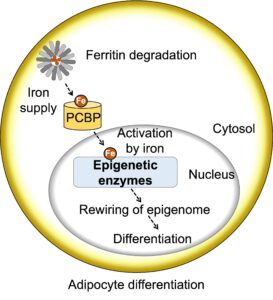Tomohiro Suzuki1,†, Tetsuro Komatsu1,†, Hiroshi Shibata1,†, Akiko Tanioka1, Diana Vargas1, Reika Kawabata-Iwakawa2, Fumihito Miura3, Shinnosuke Masuda1, Mayuko Hayashi1, Kyoko Tanimura-Inagaki1,4, Sumiyo Morita5, Junki Kohmaru6, Koji Adachi7, Masayuki Tobo6, Hideru Obinata8, Tasuku Hirayama9, Hiroshi Kimura10, Juro Sakai11,12, Hideko Nagasawa9, Hideyuki Itabashi13, Izuho Hatada5,14, Takashi Ito3, and Takeshi Inagaki1* (1Laboratory of Epigenetics and Metabolism, Institute for Molecular and Cellular Regulation, Gunma University, 2Division of Integrated Oncology Research, Gunma University Initiative for Advanced Research, 3Department of Biochemistry, Graduate School of Medical Sciences, Kyushu University, 4Division of Diabetes, Endocrinology, and Metabolism, Department of Medicine, Nippon Medical School, 5Laboratory of Genome Science, Biosignal Genome Resource Center, Institute for Molecular and Cellular Regulation, Gunma University, 6Institute for Molecular and Cellular Regulation Joint Usage/Research Support Center, Gunma University, 7Kaihin Makuhari Laboratory, PerkinElmer Japan Co., Ltd., 8Education and Research Support Center, Gunma University Graduate School of Medicine, 9Laboratory of Pharmaceutical and Medicinal Chemistry, Gifu Pharmaceutical University, 10Cell Biology Center, Tokyo Institute of Technology, 11Division of Metabolic Medicine, Research Center for Advanced Science and Technology, The University of Tokyo, 12Division of Molecular Physiology and Metabolism, Tohoku University Graduate School of Medicine, 13Graduate School of Science and Technology, Gunma University, 14Viral Vector Core, Gunma University Initiative for Advanced Research, Gunma 371-8511, Japan
About
The laboratory of Professor Inagaki at the Institute for Biomedical Sciences, Gunma University, has elucidated the iron-mediated epigenomic mechanism during adipocyte differentiation.
Iron is an essential metal for biological functions and has been associated with obesity and diabetes. However, the detailed mechanisms of its action were to be elucidated. Adipocytes, which constitute adipose tissue, arise from preadipocytes and acquire the ability to accumulate lipids. In this study, we have discovered the importance of iron in adipocyte differentiation and its involvement in rewriting of the epigenome. Iron is essential for biological functions but also contributes to the generation of harmful reactive oxygen species, so it is tightly controlled within cells. We found that the iron stored in ferritin is supplied, and then transported into the nucleus by proteins called PCBPs. Epigenetic mechanisms play a crucial role in properly interpreting the genetic information stored in the nucleus. We have further identified detailed mechanisms how iron regulates the activity of epigennetic enzymes to govern adipocyte differentiation.
From these findings, a comprehensive biological mechanism has been unraveled whereby iron alters the epigenomic information within cells, leading to adipocyte differentiation.
Paper information
Suzuki T, Komatsu T, Shibata H, Tanioka A, Vargas D, Kawabata-Iwakawa R, Miura F, Masuda S, Hayashi M, Tanimura-Inagaki K, Morita S, Kohmaru J, Adachi K, Tobo M, Obinata H, Hirayama T, Kimura H, Sakai J, Nagasawa H, Itabashi H, Hatada I, Ito T, and Inagaki I. Crucial role of iron in epigenetic rewriting during adipocyte differentiation mediated by JMJD1A and TET2 activity. Nucleic Acids Res. 2023 May 9;gkad342.
Online URL
https://academic.oup.com/nar/advance-article/doi/10.1093/nar/gkad342/7157532








